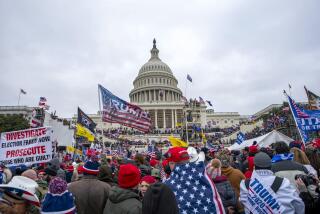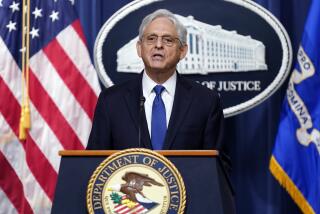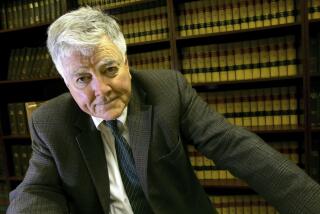‘Nixon being Nixon’ – this time under oath
Ten months after resigning the presidency, three years after the botched burglary of a Washington building that had set his downfall in motion, Richard M. Nixon drove to the Coast Guard station in San Mateo, Calif., to meet with grand jurors and, for the only time, testified under oath about the Watergate affair.
Nixon’s testimony has remained locked out of sight ever since by grand jury confidentiality rules, a last, tantalizing secret from one of America’s greatest political scandals. The transcript became public Thursday, providing a detailed view of Nixon — combative, condescending, funny, outrageous, defensive and mindful of his place in history.
For historians who sued the National Archives for access to the tapes, as well as for the nation’s legion of Watergate buffs, the testimony closed one of the last gaps in the record of the scandal and provided an irresistible look at a master politician as he sparred with some of the people who had indicted more than 60 members of his administration.
“Some people can play cards and listen to television and have a conversation at one time. I can’t,” Nixon said at one point. “I do one thing at a time, and in the office of the presidency, did the big things and did them reasonably well and screwed up on the little things, partly because the staff didn’t bring them to me.”
Unlike the often-profane voice captured by Oval Office tape recordings, the Nixon who appears in the transcripts is polite, but often disdainful of the prosecutors and their mission. He already had received a pardon from President Ford by the time he testified on June 23 and 24, 1975, and had only one thing to fear — a lie that might expose him to a perjury prosecution. He made perfectly clear he would not cooperate more than necessary.
“I am quite aware of the fact that as far as anything that I did — you gentlemen are aware of that too — that because of the presidential pardon, which was terribly difficult for me to take, rather than stand there and fight it out, but I took it — that I can admit anything with impunity,” he told his interrogators, “but you are not going to use me to try to nail somebody else simply because I am not guilty of something.”
“It’s Nixon being Nixon,” said Stanley I. Kutler, a former University of Wisconsin history professor and Watergate expert. “I would like to have $10 for every time he says ‘I don’t recall,’ ‘I don’t recollect.’ He’s really running out the clock, going in circles.”
Kutler sued for the release of the transcripts after former Nixon aide John Dean, who is researching a book on Watergate, discovered that the National Archives had them. Historians praised the unusual decision to make the testimony public. “There are certain dark corners of the Watergate story only Nixon could shed light on,” said Timothy Naftali, director of the Nixon Library.
Naftali said he had “hoped that in a roped-off, secret interview” Nixon would answer some of the scandal’s remaining mysteries, including what caused an 181/2-minute gap on one of the White House tapes. “Sadly he didn’t,” Naftali said.
“For a generation that’s old enough to remember Watergate, this discussion of coverups and ambassadors will not come as a surprise,” he added. “But for the iPad generation, it’s really important that the government is willing to open up these materials.”
Asked about the infamous erased tape, Nixon told the grand jurors that “if you are interested in my view of what happened, it is very simple. It is that it was an accident.” He dismissed the attempts by his staff to figure out what had happened as the efforts of “amateurs” and “clowns.” When he listened to other parts of the tape and heard his voice, he added, “I wonder what I had had to drink that day.”
Nixon knew what prosecutors would ask him about — the testimony came after long negotiations — and he came carefully prepared. He often returned to a favorite theme, that previous administrations had committed many of the same acts for which his aides had been prosecuted.
He lectured prosecutors that they were adopting a “double standard” by looking only at the actions of his administration. Doing so “is going to make you much more popular with the Washington press corps, with the Georgetown social set, if you ever go to Georgetown, with the power elite in this country,” he said. “But, on the other hand, think of your children — they are going to judge you in the pages of history.”
Asked about White House efforts to use the Internal Revenue Service against political opponents, particularly Democratic National Committee Chairman Lawrence F. O’Brien, whose office in the Watergate complex was the burglars’ target, Nixon responded with the story of how in 1952, when he ran for vice president, someone had leaked his income tax returns. A decade later, he said, when he ran for governor of California, files about an IRS investigation of the purchase of his home in Trousdale Estates were leaked “to the California press, to the Los Angeles Times and the Long Beach paper.”
Shown a note from his aide, John Ehrlichman, saying, “Check McGovern IRS files,” Nixon said he did not “recall suggesting Mr. McGovern, Sen. McGovern’s, files be checked.”
“What I do recall is only a suggestion that the McGovern contributors might be checked,” he said. Repeating that Democratic administrations had done much the same, he said, “I was suggesting that in the campaign, that we should be as effective in conducting our investigations as they had been in conducting their investigations.”
He also parried questions about whether he knew that aides had made commitments to appoint wealthy supporters as ambassadors in return for $100,000 contributions.
“The word ‘commitment,’ what does a commitment mean?” he asked. Only he could actually “commit” to an appointment, he said, so his administration had never made “an absolute commitment” in return for a contribution.
At the same time, he displayed disdain for professional diplomats, calling them “a bunch of eunuchs” who “aren’t for the American free-enterprise system.”
Previous administrations also had given ambassadorships to contributors, he said, recalling Franklin D. Roosevelt’s appointment of Joseph P. Kennedy as envoy to London at the start of World War II. Kennedy was a “pretty good appointment,” he said. “After all, at least he increased the Scotch supply.”
DOCUMENTS: Read Nixon’s grand jury testimony
Alexa Vaughn, Bob Drogin and David Lauter in the Washington bureau contributed to this report.
More to Read
Sign up for Essential California
The most important California stories and recommendations in your inbox every morning.
You may occasionally receive promotional content from the Los Angeles Times.










